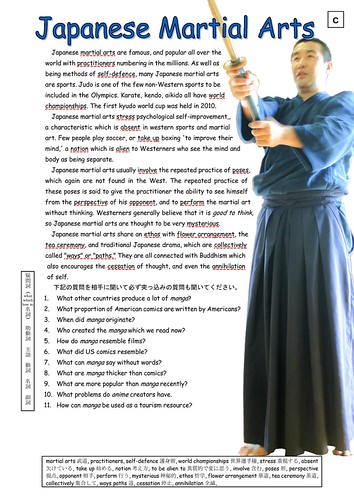Saturday, February 04, 2012
Martial and Manga Artists
The image is the partner page to the previous Anime and Manga page, which together form an information gap activity.
They are both rather too highbrow for an English conversation class but the course is on "Tourism English" and my part of the course is on explaining Japanese culture.
The explanation is my theory of Japanese culture - that both manga artists, martial artists and all Japanese have 'mirrors in their heads,' a theory which originates in the teaching of the Kurozumi church, my analysis of Japanese mythology, and Japanese common sense. Can you see yourself? Can you draw the room in which now sit from a perspective in the top corner of the room? If you got into a fight would you be able to see yourself from the point of view of your opponent?
The text reads as follows:
Japanese martial arts are famous, and popular all over the world with practitioners numbering in the millions. As well as being methods of self-defence, many Japanese martial arts are sports. Judo is one of the few non-Western sports to be included in the Olympics. Karate, kendo, aikido all have world championships. The first kyudo world cup was held in 2010.
Japanese martial arts stress psychological self-improvement,, a characteristic which is absent in western sports and martial arts. Few people play soccer, or take up boxing to improve their mind - a notion which is alien to Westerners who see the mind and body as being separate.
Japanese martial arts usually involve the repeated practice of poses, which are also not found in the West. The repeated practice of these poses is said to give the practitioner the ability to see himself from the perspective of his opponent, and to perform the martial art without thinking. Westerners generally believe that it is good to think, so Japanese martial arts are thought to be rather mysterious.
Japanese martial arts share an ethos with flower arrangement, the tea ceremony, and traditional Japanese drama, which are collectively called "ways" or "paths." They are all connected with Buddhism which also encourages the cessation of thought, and even the annihilation of self.
Labels: japan, japanese culture, Jaques Lacan, lacan, logos, manga, martial art, occularcentrism, religion, reversal, self, specular
This blog represents the opinions of the author, Timothy Takemoto, and not the opinions of his employer.

